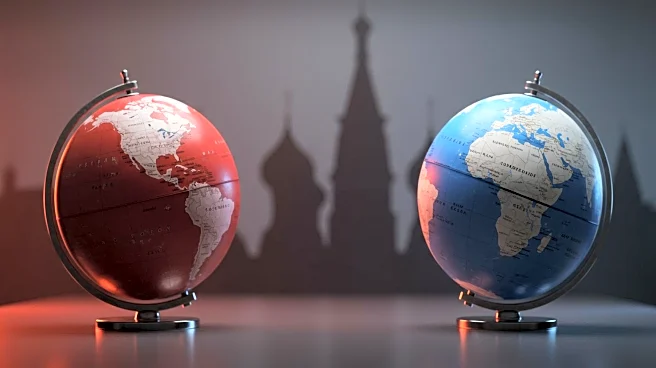What is the story about?
What's Happening?
Russian President Vladimir Putin has extended an invitation to U.S. President Donald Trump to visit Moscow for the next round of peace talks, following their recent summit in Anchorage, Alaska. During a press conference, Trump described the meeting as 'extremely productive' and expressed optimism about future discussions, despite acknowledging that no deal had been reached. The talks focused on restarting pragmatic relations between the two nations, with both leaders emphasizing the importance of a friendly and results-oriented approach. Putin praised Trump for his tone and approach, suggesting it could lead to a resolution in Ukraine.
Why It's Important?
The invitation from Putin to Trump for further talks in Moscow signifies a potential shift in U.S.-Russia relations, particularly concerning the ongoing conflict in Ukraine. If successful, these discussions could lead to significant geopolitical changes, impacting international diplomacy and security. The prospect of improved relations between the U.S. and Russia may influence global political dynamics, potentially affecting alliances and economic partnerships. However, Trump's willingness to engage with Putin may face domestic political scrutiny, given the contentious nature of U.S.-Russia relations.
What's Next?
The proposed meeting in Moscow could face political challenges, as Trump himself acknowledged potential pushback. The next steps will likely involve diplomatic preparations and negotiations to set the agenda for future talks. Stakeholders, including political leaders and international organizations, will closely monitor developments, assessing the implications for regional stability and global security. The outcome of these discussions could influence U.S. foreign policy and its approach to international conflicts.
Beyond the Headlines
The invitation to Moscow highlights the complex interplay of international diplomacy, where personal relationships between leaders can significantly impact geopolitical strategies. The emphasis on a 'friendly' tone and 'results-oriented' approach underscores the importance of diplomatic tact in resolving conflicts. This development may also reflect broader shifts in global power dynamics, as nations navigate the challenges of maintaining peace and security in a rapidly changing world.















